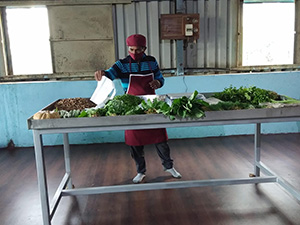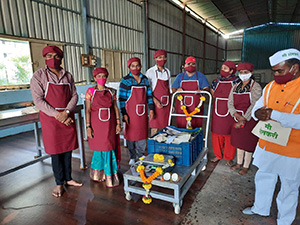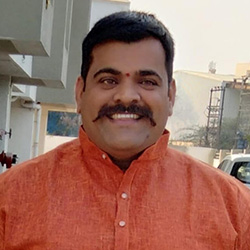
EDITION 15
Friday
August 20, 2021
WHEN THE FPC (Farmer Producer Company) IS THE NEW APMC
Creating direct access to consumers can help the marginal farmer get rid of the APMC, increase his income and provide better cost to the consumer as Our Farmz shows

Siddharth Pujari
When his father’s organic fertilizer business didn’t show great results at trade fairs, Siddharth Pujari wondered why? And that pulled him into the vortex that gobbles up the small farmer. “On deeper study, I realized why the farmer was hesitant to use organic fertilizer. Whatever he produces, he sells in the local mandi or APMC. Let’s say he goes with a truck full of freshly harvested tomatoes from his small landholding. Some of this may not be fully ripe, some get crushed in transit and some would be still raw.
“The middleman will junk raw and damaged goods and pay him only for the ripe ones. This sorting, packing he will do. And pay him, say Rs 4 per kg. And sell for Rs 30 per kg. The market pushes the farmer to use chemicals that give him higher yields and faster. So organic farming takes a back seat. The result? The poor farmer gets paid very little, the end customer pays a hefty price, and the middleman laughs all the way to the bank.”
Siddharth got fixated on changing this situation. But how? “I realized that we could help the marginal farmer if he got access to the end consumer directly.” But that meant a lot of things. Like harvesting, sorting, cleaning, packing, and finally delivering. Says Siddharth, “I was very sure I didn’t want to be a logistics company. I didn’t have the wherewithal of a Big Basket, so I had to think this through.”
What it meant was to build a network of consumers who would get their fruits and vegetable supplies directly from the farmer. But several neighbourhoods in Pune have weekly markets that sell produce directly from farmers in and around the city. Says Siddharth, “But these local markets have prices that are not at all competitive. They sell their produce at either the retail market rate or even more.

AT THE PACK HOUSE
“So, I decided that we needed to have access to customers first. I sent out my marketing team to various housing societies and with simple Google forms got inputs on who would be interested in buying veggies directly from the farmer. That too, who would come to your society premises? Then the pandemic struck. But luckily for us, my father was requested by the officials at Sahkar Sankul if we could help out various societies with their need for vegetables? That helped us furthermore.”
Very obviously, Google forms were not enough or right. Siddharth built an app where consumers could place their orders for the week and farmers would know their requirements. In addition to that, they would also know what was ready for harvest, what was picked, cleaned, packed, and ready for distribution. This app cost him Rs 25 lakhs to build.
Lady Luck favours the brave. “I was ready to put in all I owned into this project, but an Israeli water purifier company, May Galim showed an interest in our company. They saw our data of farmers as potential customers for the water purification systems that they plan to launch for the Agri sector. So, they pitched in $30,000/- and Our Farmz was ready to be launched.
While Our Farmz was one part of his business, there was a whole lot yet to be done. “While I knew a lot of farmers from areas around Pune, I had to onboard them. Since I was clear that I would not get into the logistics of the business, I asked them if they would set up an FPC to benefit themselves. It is odd that though the Govt has schemes to help the small farmer, not many know how to leverage it. So 400 farmers at Shikrapur with holdings ranging from one to six acres set up their own FPC. As per their scheme, they pooled in Rs 2 Lakhs and the Govt pooled in an equal amount.”
With this the farmers of Shikrapur now had their own place and machinery where they would sort, clean, and pack their produce. “They employed their wives to do this job. Regarding the delivery to the societies, they initially hired vehicles but now have their own.”

INCREASED JOB OPPORTUNITIES FOR FARMERS’ FAMILIES
Again, Siddharth leveraged the Govt scheme that helps farmers transport produce by providing 50% of the cost. Today, Our Farmz services five societies in Baner and Balewadi area. “We deliberately chose societies with large numbers of families. This is because it makes things easy for the farmers.”
Our Farmz delivers the produce to their societies on Thursdays and Sundays. “It is mandatory that the farmers give a minimum 20% discount to the consumers.” Higher price to the farmer, discount to the consumer, but what about Our Farmz? Says Siddharth, “we take a 15% commission on the retail price. This month, the company broke even and posted Rs 1.5 lakh revenue in the first three weeks.
Says Siddharth, “I realized what it means to be a businessman and be an entrepreneur. At TiE Pune I learned that a businessman will look at the profits he can make whilst an entrepreneur will think of the value he can provide to the customer, the employee, and society. And along the way he will benefit from it. In all our learnings my mentors like Ravi Nigam, Vivek Kumar, Pratima Kirloskar never spoke of profits. They stressed on value. And I think this has seeped into the entrepreneur community today.”
Doing away with the mandi, benefitting the small farmer, empowering them with access to customers, giving better produce and prices to the end user looks like a happy ending for all. But Siddharth plans to stretch this story far and wide. “Our app was built to be scalable. I can use the same app to service Delhi if I can get farmers from areas near there or Mumbai. Anywhere in India.”
On the recent Farm Laws? “I think they’re a good thing because they will help the end consumer. Like I said before, the poor farmer uses harmful chemicals that impact health dangerously simply because he is pressured by the market forces (read APMC, middlemen) to increase his yields. But with better access to the market, he will adapt better farming practices. Also, if corporates get into buying from farmers, they are better placed to deal with his yields since they will provide better warehouses, food processing factories that can deal with all types of produce.”
Farmer Speak:

Mayur Gawale
Mayur Gawale owns a four-acre farm and grows onions predominantly. He is also one of the directors of the FPC
We formed this FPC on 31 Oct last year. 10 directors and 50 farmers bought shares. Directors bought shares worth Rs 50,000 each and farmers bought 10 shares worth Rs 1,000 each. Total paid-up capital is Rs 5,50,000 lakhs. We have a place where we sort, clean, weigh and pack the produce. We employ 10 people and pay them Rs 200 per hour. And we sell directly to the consumer. In the old days, we’d sell in the mandi. The mandi system is such that there are five to six people in the middle who have to be paid right from the hamaal who lifts your produce to the buyer. Moreover, this system favours the buyer. We do not get paid properly, and the end-user pays much more than what we charge currently. Our Farmz is really good because it helps sell our goods at a good price and the buyer also gets a discount. Everyone is happy. What more can we ask for? Yes, we want to have more societies in our customer pool as we have more produce than we are selling. But guess that too will work out.”

Satyawan Batwal
Satyawan Batwal owns a three-acre farm and grows leafy veggies
“Selling direct to home has been very beneficial to me. Earlier when I took my vegetables to the APMC market I would make approximately Rs 30 to 40,000 per month. Now that we sell directly to the end-user, I make about Rs 70-80,000 per month. Also, the customer is assured of getting vegetables directly from the farms. My wife and daughter too work at the FPC and help sort, clean and pack the vegetables. They make Rs 150-200 per hour and work about four hours. I am very happy with this. In fact, all us farmers bought shares in the company Rs 100 each and 10 shares for which we will get dividends too at the end of the year.”
Govt’s Helping Hand
Maharashtra has approximately 400 FPCs of which 60 are operational and about 25 are making profits. Below are the schemes that are aimed at helping the marginal farmer:
- FPC grant: here the farmers’ groups put up capital and the Govt adds an equal amount of money to be used to buy assets, increase capacity, technology, incubation, etc.
- Pack House: based on the project the Govt subsidizes assets, operations up to 40%
- Subsidy for transportation: up to 50%
- Credit Grant: Up to Rs. One Cr
Contact us if you have a story to tell: rashmi.ghosh@tiepune.org

